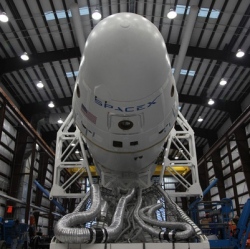
In science fiction, landing a rocket seems like no big deal. It’s much more difficult in real life, which is why SpaceX founder Elon Musk was so excited when the Falcon 9 landed intact near its launch pad at Cape Canaveral on Monday night after launching satellites to space.
This is a big deal because rockets are expensive. The Falcon 9 that SpaceX uses costs around $60 million to build, the company told NBC News. Fuel costs per launch are about $200,000.
Most rockets are designed to burn up during re-entry. That means rebuilding a $60 million rocket for every single space mission, not exactly the most cost-effective system.
Reusable rockets, however, would mean cargo could be sent into space with only the fuel and maintenance costs to consider.
"If one can figure out how to effectively reuse rockets just like airplanes, the cost of access to space will be reduced by as much as a factor of a hundred," Musk said on SpaceX’s website.
"A fully reusable vehicle has never been done before. That really is the fundamental breakthrough needed to revolutionize access to space."
If it’s 100 times cheaper to send something into space, imagine how many more companies would be able to launch space ventures, ranging from satellites to commercial space flights.
"With lower costs and competition, prices could fall, stimulating demand for more access to space," Scott Pace, director of the Space Policy Institute at George Washington University, told NBC News.
While the Falcon 9 landing was "an important" step toward reusable rockets, Pace said, SpaceX engineers still have a lot of work to do. So far, they have managed to land the first stage of the Falcon 9 rocket.
"The next step is to see how much it costs and how long it takes to refurbish the recovered stage and fly it again," Pace said.
Musk has repeatedly talked about the importance of reaching the Red Planet, not only for NASA pioneers, but for ordinary people. Considering it cost around $2.5 billion to send the Curiosity rover to Mars, prices will have to drop a lot to make sending large groups of human colonists feasible.
"This is a critical step along the way toward being able to establish a city on Mars," Musk told reporters on Monday. "That’s what all this is about."
